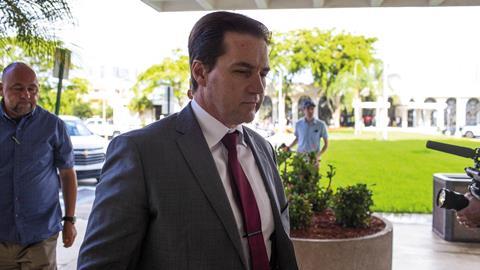As Australian billionaire Dr Craig Wright’s court cases over the bitcoin digital currency continue, growing judicial expertise on cryptoassets may help to make England a forum of choice
Master of the rolls Sir Geoffrey Vos regularly states his ambition to make England and Wales the jurisdiction of choice for matters to do with cryptoassets.
But the person doing more than anything else to build judicial expertise in the sector is a highly litigious billionaire. Dr Craig Wright (pictured above), an Australian computer scientist long resident in Surrey, this month chalked up procedural victories in two of a continuing string of legal matters arising from his claim to be the pseudonymous ‘Satoshi Nakamoto’ who in 2009 invented the bitcoin blockchain-based digital currency.
The latest rulings follow Wright’s victory – and award of £1 in damages – in a libel case against a UK podcaster. That matter will return to court in April when Wright is expected to vigorously contest an allegation that he leaked the embargoed judgment. Another Wright libel case, against a Norwegian blogger, will be heard by the Court of Appeal in Oslo this summer.
All this is a runup to what many on the international crypto scene see as the main event: a clash over a challenge by a US-based group of software developers, the Crypto Open Patent Alliance (COPA), to Wright’s claim to have written the seminal ‘Satoshi’ white paper. Wright claims that COPA is infringing his copyright by hosting the paper on its website. COPA says: ‘We have the legal right to host this original bitcoin whitepaper and with any claims purporting to constrain its free availability are baseless.’
This month’s judgments were a Court of Appeal go-ahead for a claim that could radically change the common law relating to fiduciary duty and a High Court judge’s granting of permission in another matter to serve a claim out of jurisdiction.
Wright’s claim to be Satoshi, which Lord Justice Birss noted is ‘hotly disputed’, was not relevant to the first decision, which overturned a ruling in which Mrs Justice Falk last year dismissed a claim by Wright’s company Tulip Trading against bitcoin developers outside the UK. Wright is arguing that the developers have a duty to write software ‘patches’ to help him regain access to bitcoin currently worth £2.1bn following a 2020 hacking attack. (There is no suggestion that the developers had anything to do with the attack.)
'The claimants may consider themselves unlucky to have had their application for leave to serve out come before a judge with at least some understanding of the technology involved here'
Mr Justice Mellor
Birss acknowledged that success for Tulip ‘would involve a significant development of the common law on fiduciary duties’. However he was persuaded ‘there is a serious issue to be tried’. A key point of argument in the case is the governance of so-called ‘De-Fi’ (decentralised finance) assets, of which bitcoin is the best known. Whatever the value of the highly volatile sector by the time it comes to court, it is likely to be widely watched.
Wright’s Satoshi claim is highly relevant to the second ruling. It was handed down this week by the Honourable Mr Justice Mellor following a one-day hearing concerning the intellectual property in three bitcoin databases. Wright alleges that so-called ‘airdrops’ by bitcoin networks create branches in the blockchain which infringe his intellectual property rights.
Granting the application, Mellor said that he was satisfied that the claims of infringement in the blockchain met the ‘serious issues’ test for service out of jurisdiction. In this he was assisted by the inclusion of the ‘Satoshi’ white paper, indisputably a literary work under the Copyright Designs and Patents Act, within the code.
However the bulk of the judgment deals with Wright’s claim to copyright in a file format rather than any content within it. Mellor, who trained as an engineer before going in to the law, and specialised in intellectual property, devoted 17 pages of the judgment to the authorities on whether such software can be copyrighted. His answer was no.
‘I am unable to take what might be termed the “easy” option and allow this claim to literary copyright to proceed,’ Mellor concluded. With ‘no serious issue to be tried, I see no reason why any of the defendants should be burdened with this particular claim’.
He gave permission for Wright to serve a re-amended form, omitting the file format claim, out of the jurisdiction.
In his concluding remarks, Mellor wryly observed: ‘The claimants may consider themselves unlucky to have had their application for leave to serve out come before a judge with at least some understanding of the technology involved here.’
If Wright’s taste for litigation – and ability to pay – continues, judicial expertise about the crypto world looks set to expand.





































2 Readers' comments